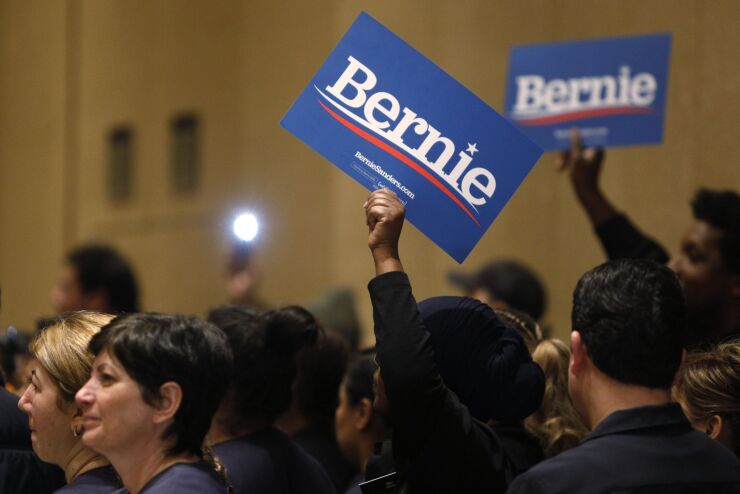LAS VEGAS – Bernie Sanders decidedly won the Nevada Democratic caucuses on Saturday.
He did not fare so well Monday with panelists in Las Vegas taking the stage on the second day of the SFVegas 2020, the Structured Finance Association’s annual asset-backed securitization industry conference.
The Sanders campaign platform, and those of the other Democratic presidential candidates, came under close scrutiny – and doubts – from an ABS industry panel that led off an excursion into politics for most of the morning sessions. (In addition to a keynote fireside chat with former U.K. prime minister Theresa May, the SFA also hosted an hourlong presentation by Democratic political commentator Donna Brazille and Ana Navaro, a GOP strategist and contributor to the CNN and Telemundo cable networks.)
The Elections 2020 panel focused on topics such as the long-shot proposal for a wealth or transaction tax on Wall Street, as well regulatory changes a Democratic administration could enact affecting housing reform or banking oversight.
“There are real governors on what can actually be achieved” by a Sanders or Elizabeth Warren administration in terms of enacting legislation for a wealth or transaction tax on Wall Street, said Jaret Seiberg, a managing director of Cowen Washington Research Group. “Difficult legislation is actually difficult to pass.”
“One of my favorite lines was from former Gov. [Mario] Cuomo, who said you campaign in poetry but you govern in prose,” saidIsaac Boltansky, director of policy research at Compass Point and other panelist on the discussion group, which was moderated by Politico reporter Katy O’Donnell. “As it turns out politicians on the campaign trail promise things they don’t intend to follow through.”
The panelists all agreed the likelihood of any “radical” plans from a Democratic administration passing through the next Congress is nonexistent, including the widely touted plan by some candidates to reduce or even forgive more than $1.5 trillion in student loan debt. Such plans
in outstanding asset-backed securities in private and legacy FFELP student loans (known as the SLABS market).
But the bearing a new administration could have on banks could still be substantial via the regulatory branches under its control. The GSE reform policies under current Federal Home Finance Agency director Mark Calabria (including pushing Fannie Mae and Freddie Mac out of conservancy) could shift back into the slow lane. Capital restrictions on banks could tighten, and punishments against institutions running afoul of federal standards could be more severe, the panelists noted.

Should the Democrats take over the U.S. Senate majority, and push U.S. Sen. Sherrod Brown, D-Ohio, in the powerful chairmanship of the Senate Banking Committee, a war on big banks could commence without the need for major legislation such as the Dodd-Frank Act. “Putting regulators in place would have to go through Sherrod Brown’s committee,” said Seiberg, which “would be committed to using capital rules and other things to punish banks that are large, and probably encourage them on their own to break up.”
“That’s the type of thing that could happen and the market hasn’t yet really come to appreciate.”





